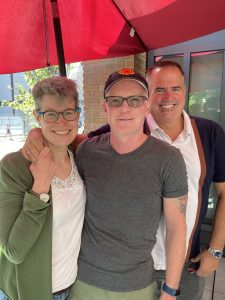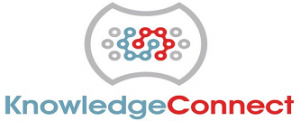Year in Review: the long run for positive change

Janet Madsen, Stacy Leblanc, and Marc Seguin
The annual report theme, the long run for positive change, reflects another interesting year working with our members, allies, and other community members, and we are glad to be on this journey with you all. As COVID continued to impact the ability of the team to host in-person events, we carried on with programming virtually via Zoom. While virtual trainings pose some challenges, including Zoom fatigue, there are also some opportunities and benefits: the ability to reach a broader audience across the province, and across the country; convenience; ease of participation; staff are able to attend events as a group; you can wear your pajamas and bunny slippers (although to be fair, some past in-person events also had participants in pajamas and bunny slippers). Our job as hosts is to try and create an energy or spirit for the events, or what Priya Parker would call “a temporary alternative world”, and virtual events are no exception. In some ways COVID gave us a bit of a gift, it gave us permission to take some risks and experiment, and most importantly to be curious.
We definitely look forward to returning to in-person events (in fact as you’ll read below the PLDI took the plunge back in June and hosted a very successful, and safe, Communications Skills training), but we also look forward to continuing to offer many presentations virtually.
Positive Leadership Development Institute
The Positive Leadership Development Institute (PLDI) provides training for people living with HIV in BC and features three main modules: Core Leadership Training, Board Governance Training and Communication Skills Training. Since the launch of the program, in 2009, 255 people have completed Core Leadership Training: Who am I as a leader?
provides training for people living with HIV in BC and features three main modules: Core Leadership Training, Board Governance Training and Communication Skills Training. Since the launch of the program, in 2009, 255 people have completed Core Leadership Training: Who am I as a leader?
Due to ongoing COVID-19 considerations, this year the PAN PLDI training team, and our partners through the PLDI-IDLP National Alliance, adapted two of our in-person trainings to an online format: Core Leadership Training and Governance Training. We were also excited to return to our first in-person training, offering the Communications Skills module in June 2022 with 12 courageous people in attendance. This past year we built on virtual offerings over Zoom, and provided PLDI graduates with multiple interactive support and skills building sessions. Campfire Café & Nurturing Ourselves were quite popular.
PAN, with partners COCQ-SIDA (Quebec) and the Ontario AIDS Network, was successful in our PHAC CAF funding application and we will be able to continue offering PLDI trainings across the country until spring 2027.
A highlight of particular note this year was PLDI participation at the International AIDS Conference in July 2022 in Montreal. We presented a workshop titled Don’t call me resilient: HIV, resiliency, connection and diversity. We also staffed a Global Village booth to get the message out that under our new PHAC agreement, PLDI online trainings will now be accessible to PLHIV across Canada.
After a thorough recruitment process PLDI BC recruited two new amazing Trainer-In-Training team members who joined us in May 2022: Amanda T and Jeremy Mailloux. Working with PLDI BC, COCQ-SIDA was successful in recruiting an Indigenous Outreach Coordinator for our PLDI National Alliance project to establish sustainable relationships within Indigenous and African, Caribbean and Black (ACB) communities to evaluate the content of the PLDI training for cultural safety and inclusion.
These quotes speak to the success of the PLDI in BC:
“It was so so valuable to be connected in a community of likeminded and warm, loving individuals. I hope to take these friendships and connections with me to the end of my days.”
“A strong sense that I am a kick ass individual and have so much growing and connecting to do. I can’t wait to do so much more in my HIV community.”
We would like to acknowledge the excellent PAN PLDI training team: K. Webster, Berta, Monte Strong, John Dub, Dakota Descoteaux, Val Nicholson, Amanda T, and Jeremy Mailloux.
Capacity Building Events and Virtual Learning
 Highlights from the past year include:
Highlights from the past year include:
Educators’ Roundtable (virtual): We offered two intensive half-day sessions with Indigenous Educator Len Pierre – Indigenous Trauma & Equity Informed Practice & Decolonizing Substance Use.
Explorations in Leadership for People with Lived Experience of hepatitis C: We developed and launched (on World Hepatitis Day) an online course which is a peer-led initiative where hepatitis C community leaders modeled their skills and knowledge to inspire other community members to embark on leadership journeys. Check out the course and share it with potential participants.
Webinars/Virtual Events/Regional Events: Sessions included Ensuring Supportive Services for Men in Sex Work; Two-Spirit Reconciliation; Party n Play 101; Alcohol Harm Reduction, Managed Alcohol Programs; Multi-Substance Use in the North; STBBI Testing: Getting connected to self-testing and care providers; HIV Self-Testing; Building relationships with municipalities for advancing harm reduction; Healing Inner Voices (Film screening and discussion).
CATIE: We worked with CATIE and the BC Hepatitis Network to co-host a 4-week course for frontline service providers, HIV and Hepatitis C Testing.
Canadian Association of Nurses in HIV/AIDS Care (CANAC) Conference: We were invited by Serena Eagland to develop a pre-conference community-focused day for attendees of CANAC’s 30th annual conference. Featured: Indigenous Trauma & Equity Informed Practice; HIV Criminalization: What Do You Need to Know?; Reducing the Harms of Colonialism.
Additional highlights: PAN was successfully funded to continue providing capacity building opportunities to its member organizations and allies (via PHAC CAF) for another five years; the Interior Health BBI Network has graciously invited PAN’s capacity building team to participate in this important network of community-based and health authority members.
We invite and encourage you to visit the resources section of our website for recordings and resource material from various events hosted this past year.
Some things we look forward to in the coming months include welcoming new team member Cora Lee Garcia, who has the role of Indigenous Programming Coordinator; having our first in-person Core Leadership training in almost three years (scheduled for November); providing an in-person Educators’ Roundtable (date pending); hosting a two-part virtual training series with a focus on gender related topics; and the launch of our KnowledgeConnect Learning Portal.
I want to extend my thanks to the Capacity Building and Leadership Team this past year: Monte Strong, Marc Seguin and Janet Madsen. I also want to acknowledge our event participants, our member organizations, community partners and allies, as you inspire us and our respect for your work is deep. We are grateful to the Public Health Agency of Canada (Community Action Fund) and the Vancouver Foundation for their support for our departments programming.
For more information on Training and Leadership programs and events, contact Stacy Leblanc, Director of Capacity Building Initiatives, [email protected]
Team Reports

Image: distelapparath on Pixabay
Shoes Image: StockSnap on Pixabay
